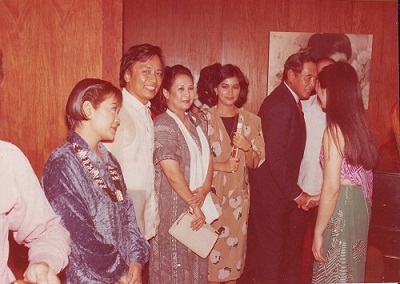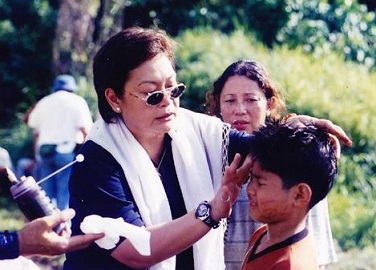By PABLO A. TARIMAN
IN her short but fruitful life, filmmaker Marilou Diaz Abaya (1955-2012) lived and breathed music which was also an integral part of all her film output.
Abaya’s passion for classical music remained one of the hallmarks of her personality. She breathed her last at the St. Luke’s hospital bed Monday night while listening to Cesar Montano sing Don McLean’s “Vincent.”
Two years before her death, Abaya admitted she was already fascinated by Mozart’s Requiem which some people always associate with funerals.
Interviewed for an All Soul’s Day story, she confided: “Mozart’s Requiem, as do all his sacred music, always pulls me away from earth and transports me to a heavenly experience. In that part called the Introitus, I associate the few notes played on a bassoon (accompanied by the string section and followed by the rest of the winds) as Mozart himself mourning his own death even before he actually expires. There is a subsequent build up with the brasses; and then the chorale storms heaven with an urgent plea, joining in the glorious Communion of Saints who begs for Mozart and for all his fellow mortals: Requiem aeternam dona ets, Domine, et lux perpetua luceat ets. (Grant them eternal rest, O Lord, and may perpetual light shine on them.) The Requiem does not at all sound like a funeral march. Rather, it is, at least for me, a fervent prayer for eternal life.”
The film director notes that the story behind the Mozart’s Requiem is as unearthly as the music itself. A stranger commissions Mozart to write a Requiem. Mozart composes it even as he himself falls ill and prepares to die. The composer tells his wife Constanze that he is writing the Requiem for his own funeral. He dies before completing the score. Nevertheless, the stranger re-appears to collect the work.”
Her favorite opera was no doubt Verdi’s La Traviata which was also a favorite of one of her best friends, National Artist for Film Ishmael Bernal. “In that opera, lovers are reunited in death. For Violetta and Alfredo, Gran Dio! morir si giovane — “O, God! to die so young” is not a cry of despair, nor is it the end. After singing the duet, Violetta suddenly revives, exclaiming that the pain and discomfort has left her. A moment later, she dies in Alfredo’s arms. We are worth who we love, how we love, and what we sacrifice for love. Love assures the worthiness of death.”
 Abaya’s last film was “Ikaw Ang Pag-ibig” which was adjudged best film in the recently concluded Catholic Mass Media Annual Awards.
Abaya’s last film was “Ikaw Ang Pag-ibig” which was adjudged best film in the recently concluded Catholic Mass Media Annual Awards.
In between shooting films and attending film festivals, Abaya would find time for a concert especially when her best friend, pianist Cecile Licad, is in town.
“Her performances always leave me in tears,” Abaya once said. “In her, you get not just her music but a view of life as we live it. Few artists can do that to her audience.”
Abaya and Licad became best friends through the years. Licad and her cousin, film scorer Nonong Buencamino, attended Abaya’s first chemotherapy session at St. Luke’s Hospital in 2007 when she was first diagnosed with breast cancer.
“How terribly sad,” Licad reacted when she learned of Abaya’s death Monday night at St. Luke’s Hospital. “I will always remember the happy times and the inspiration she has given me. I will reconnect with her when I play Chopin’s funeral March sonata in a few days.”
Understandably, Abaya’s love for music translates well in most of her films. Abaya’s art and life were summed up in the only film documentary entitled “The Accidental Filmmaker: A Tribute to Marilou Diaz-Abaya directed and produced by Mona Lisa Yuchengco. 
Running close to two hours, the film zeroes in on her landmark output (Brutal, Jose Rizal, Muro-Ami, Karnal, among others), her TV projects (Public Forum, etc.) and most of all, her views on art, life and her least known private sorrow, battling cancer since 2007.
Some memorable interviews in the documentary had her saying that an artist’s life is not about trophies, awards and achievements. Being an artist is not about money, she pointed out, although she perfectly understood the producer’s agenda. “Being an artist is also about confronting art and life and their uncertainties.”
Her parting words in the documentary: “It is easy to let go of all earthly concerns when you remain basically a child of God.”
(Abaya’s remains lie at the Ateneo de Manila University chapel (Gonzaga building) in Quezon City until Friday. Masses will be celebrated everyday at 6:55 a.m., 12 p.m., 6 p.m. and 8 p.m. She will be laid to rest on Saturday at Loyola Memorial Park in Parañaque City.)
